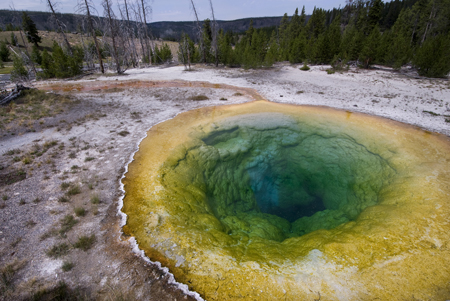As temperatures rise around the world, species need to adapt to the changing ecosystem in order to thrive. In 2008, drought and high temperatures cost $2 billion in agricultural losses to California, Texas, North Carolina, South Carolina, Georgia and Tennessee. Finding ways in which plants can adapt and thrive in higher temperature regions would help reduce food security concerns.
In Yellowstone National Park, where the temperature of the soil can reach 55 degrees Celsius (131 degrees Fahrenheit), researchers found a fungus called Curvularia protuberata that can live in the tropical panic grass Dichanthelium lanuginosum without harming it. Interestingly, when they are separated, neither the fungus nor the grass can survive at temperatures exceeding 38 degrees Celsius.
Studies have shown the symbiosis is actually a three-way relationship, involving a double-stranded RNA virus in the fungus that is crucial to the heat tolerance trait. Researchers do now know, however, just how the symbiotic relationship allows the plants to thrive in heated environments. By sequencing the fungus and studying how the genetic information is altered by the presence of the virus, researchers hope to understand the molecular pathways involved in conferring heat tolerance and use that information in turn to find ways of helping other plants adapt to the warming global climate.
Principal Investigators: Marilyn Roossinck and Mustafa Morsy, Samuel Roberts Noble Foundation
Program: CSP 2010
